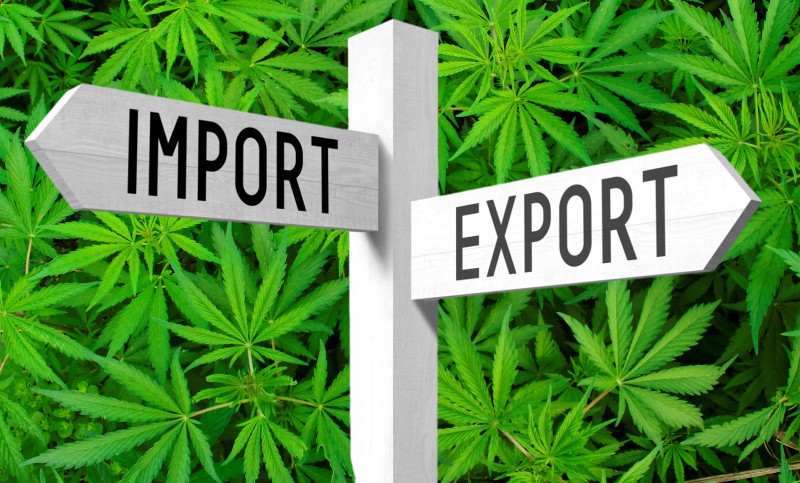
According to recently released data from Health Canada to MJBizDaily, Canada's medical cannabis exporters found their most significant markets in Australia and Israel last year. During the fiscal year from April 2022 to March 2023, Canada shipped 59,986 kilograms (approximately 132,200 pounds) of medical marijuana flower abroad. This marked a substantial 48% surge compared to the previous year's export volume of 40,640 kilograms.
This is overlapping with the news that Colombia is already shipping thousands of pounds of cannabis to Europe due to resolution 539 that was voted into their constitution earlier this year. The cannabis import and export business appears to be growing by the month despite UN drug treaties that forbid the sale and shipping of marijuana.
Nevertheless, the overwhelming bulk of exports was concentrated in just three countries, raising concerns about exporters' potential vulnerability due to over-reliance on a limited number of markets. An astonishing 80% of these exports were directed to Australia and Israel, jointly responsible for importing 47,332 kilograms of Canadian cannabis flower.
As reported by Health Canada data, Germany emerged as the next significant importer, receiving 9,560 kilograms, equivalent to approximately 16% of the overall export volume. Over the period since 2017, Canada has exported a total of 126,025 kilograms of medical cannabis flower for both commercial and scientific purposes. Germany is also importing medical cannabis from Jamaica through a company called Cannim.
In aggregate, the value of Canada's medical cannabis exports in the past year surged to 160 million Canadian dollars ($118 million), marking a remarkable 50% increase compared to the previous fiscal year, 2021-22.
During a phone interview with MJBizDaily, Aurora Cannabis CEO Miguel Martin expressed his perspective on medical cannabis exports, emphasizing their long-term potential for his company. He highlighted this as a substantial opportunity, noting that profit margins are approximately 2.5 times higher than those in Canada's recreational cannabis market, and these margins show no signs of decline.
Australia, on the other hand, emerged as the primary destination for Canadian cannabis extracts. Among the top five importing nations, Australia alone accounted for 93% of the total medical cannabis extract products exported, which amounted to 8,392 liters (2,217 gallons).
The Cayman Islands ranked second in Canadian exports, receiving 320 liters. Brazil, Barbados, and South Africa completed the top five list for the previous year, with import volumes of 136 liters, 103 liters, and 90 liters, respectively.
Pushing Export Growth
Several factors are driving the growth of Canadian cannabis exports. One significant factor is the increasing quality of products available in the Canadian domestic market. However, the domestic market is saturated with competition and oversupply, prompting Canadian cannabis producers to look overseas for opportunities.
Another crucial factor is the higher profit margins available in international markets, partly due to excise levies within Canada. Additionally, the global cannabis market has relatively few competitors capable of navigating the high barriers to entry in many countries, giving Canadian producers an advantage.
The excellent reputation of Canadian medical cannabis products abroad also contributes to their export success. However, the export market is becoming more competitive, with countries like Colombia and Denmark aiming to capture a share of Canada's market.
Furthermore, more nations aspire to be net exporters rather than importers, indicating increasing competition in the global import/export cannabis market in the coming years.
Canadian licensed producers face the risk of becoming overly reliant on a select few international markets, which can be unpredictable due to regulatory changes that can occur suddenly. According to Martin, there is confidence that more import markets will open up in the future, particularly in countries where slow-moving regulations are not keeping up with the rising demand.
He pointed out Poland and the United Kingdom as nations with significant potential. For businesses like Aurora, regulatory stability is a crucial consideration. Martin emphasized the importance of being in markets where the regulatory framework is predictable, even if it evolves slowly. Using the German example, he highlighted the substantial opportunity in preparing for such markets instead of relying on uncertain developments in other regions like the Netherlands.
Notably, most importing countries demand compliance with European Union-Good Manufacturing Practice (EU-GMP) certification or similar standards, which is both costly and time-consuming. As Martin noted, EU-GMP-certified cannabis flower is a valuable and scarce resource. It's an expensive and challenging endeavor that only some organizations undertake at scale, and many markets mandate this certification.
Martin concluded by pointing out that as new markets emerge, it's not just their size that matters but also the capacity of companies to meet the demands of these markets. Typically, multinational corporations tend to be the winners in these evolving international markets.
Continuous Rise In Exports
Deepak Anand, the principal of ASDA Consultancy Services in Surrey, British Columbia, has pointed out that Canadian cannabis exports are gaining momentum, primarily because several countries permitting medical cannabis sales still lack sufficient domestic production to meet their demand. An example he cited is Australia, which is in the process of licensing more cultivators but still needs to meet domestic consumption in its regulated market, necessitating continued imports.
However, Anand cautioned that recent regulatory changes in Australia could pose challenges for potential exporters. As of July, stricter import requirements have been imposed on all imported medical cannabis products in Australia, potentially limiting the volume of products that can continue to enter the Australian market.
Anand keeps a keen eye on Portugal, where he anticipates increased imports. He noted that many exporters are now targeting Portugal, aiming to serve the German market. According to Anand, exports to Portugal have significant revenue potential, making it an attractive destination for Canadian cannabis exporters.
Conclusion
Canadian cannabis exports are rising due to the demand-supply imbalance in several countries that permit medical cannabis sales but lack adequate domestic production. Australia, in particular, has been a notable importer due to insufficient local cultivation to meet regulated market demands. However, recent regulatory changes in Australia, with stricter import requirements, may pose challenges for future exports to the country.
Despite these challenges, there is optimism in the industry, with attention turning to emerging markets like Portugal, which is seen as a gateway to the lucrative German market. The potential for revenue generation through exports is significant, attracting Canadian cannabis exporters to explore new opportunities and navigate evolving regulations in pursuit of international growth.






